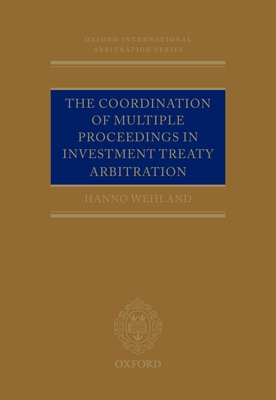This is the first work to comprehensively address the issues arising in the context of multiple proceedings before investment treaty tribunals and propose a systematic approach to applicable coordination mechanisms based on a methodical review of international investment agreements, arbitration rules, arbitral decisions, and legal commentary.
This is the first systematic analysis of multiple proceedings arising from investor-state disputes, including proceedings before multiple arbitral tribunals, the domestic courts of host states, and other forums such as the European Court of Human Rights. It seeks to identify clear, predictable, and sensible coordination mechanisms and to suggest an application of these mechanisms that reduces jurisdictional fragmentation, jurisdictional competition, and the potential for abuse of the complexities of the system of international investment protection. The author explains how uncertainty in the area extends to several issues: there are doubts as to which forums have jurisdiction over a dispute and to what questions exactly this jurisdiction extends; there are doubts as to the mechanisms that should be applied to coordinate multiple proceedings (including consolidation, hierarchical coordination mechanisms, lis pendens and res judicata, and general principles of comity and prohibition of abuse of process) and how these mechanisms relate to each other; there are also doubts as to the law applicable to coordination mechanisms and the specifics of their application.The book begins with an examination of the characteristics of the international investment framework that frequently lead to multiple proceedings. It then addresses the issue of determining jurisdiction, a prerequisite for the application of any mechanism for further coordination. The author goes on to examine the role of agreed coordination (such as the consolidation of proceedings) versus ''default'' coordination mechanisms; the role of hierarchy of forums in coordination, which he argues is relevant when coordinating treaty proceedings on the one hand and non-treaty proceedings on the other; the principles of lis pendens and res judicata, which he argues apply only under limited circumstances; and concludes with the establishment of guidelines regarding the application of the principles of comity and the prohibition of abuse of process. This inherently practical subject is exclusively concerned with the existing law and seeks to provide serviceable solutions to the uncertainty facing practitioners and scholars in the current climate of investment law.
Get The Coordination of Multiple Proceedings in Investment Treaty Arbitration by at the best price and quality guranteed only at Werezi Africa largest book ecommerce store. The book was published by Oxford University Press and it has pages. Enjoy Shopping Best Offers & Deals on books Online from Werezi - Receive at your doorstep - Fast Delivery - Secure mode of Payment
 Jacket, Women
Jacket, Women
 Woolend Jacket
Woolend Jacket
 Western denim
Western denim
 Mini Dresss
Mini Dresss
 Jacket, Women
Jacket, Women
 Woolend Jacket
Woolend Jacket
 Western denim
Western denim
 Mini Dresss
Mini Dresss
 Jacket, Women
Jacket, Women
 Woolend Jacket
Woolend Jacket
 Western denim
Western denim
 Mini Dresss
Mini Dresss
 Jacket, Women
Jacket, Women
 Woolend Jacket
Woolend Jacket
 Western denim
Western denim
 Mini Dresss
Mini Dresss
 Jacket, Women
Jacket, Women
 Woolend Jacket
Woolend Jacket
 Western denim
Western denim
 Mini Dresss
Mini Dresss






























































